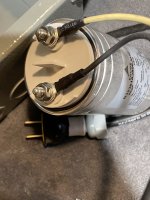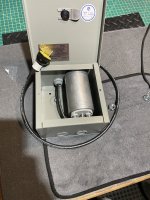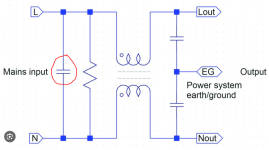So I devised this 80uF MKP 330VAC cap in a nice box connected to mains. It's on the same circuit as my system - DAC/Pre/Amps/Computer. It makes it all sound way better - like a good power day, every day!
Any thoughts on this? Nice little noise filter? If this is the result, everyone should have a cap box.
Any thoughts on this? Nice little noise filter? If this is the result, everyone should have a cap box.
Maybe it's doing nice things for the power factor. The power companies place strategically located capacitor banks at various points on the grid to counteract the inductive effect of the power lines and clean up the power factor. I see them all the time clustered on various power poles.
Man, the bass, the sound-stage, holographic effect of good hifi - brings it right out of the DAC. Details... It places instruments further away and wider apart separating out the detail. I've been A-B'ing it for a while now.
Did you simply connect the cap's two contacts to hot and neutral of your AC ("suicide leads")? No connection of cap to earth/ground?
I have a box of Dayton 17.5uF 330VAC oil-filled polyropylene motor run caps that I could make into a cap bank to give this a try.
Question: Is this dangerous? Is a typical metal can, oil-filled metalized polypropylene motor run cap suitable for this kind of use?
I have a box of Dayton 17.5uF 330VAC oil-filled polyropylene motor run caps that I could make into a cap bank to give this a try.
Question: Is this dangerous? Is a typical metal can, oil-filled metalized polypropylene motor run cap suitable for this kind of use?
Last edited:
Yes I did, and if you have 120v 330VAC would be good. Think rule of thumb is double, you got it there, so do I. Mine is 80uF, however I also tried this with a 4.7uF, same effect, don’t think it needs the capacitance. I’d totally give it a try. Give it a sec to start filtering and critically listen, ideally to a track with a lot of detail. A-B it.
The cap I bought is general purpose, but essentially a motor run.
The cap I bought is general purpose, but essentially a motor run.
Yes, 120V AC (USA).
I suppose the safest way to try this would be to put the capacitor in a plastic project box with an IEC female connector, and use a removable IEC cord to connect it to the 120V outlet.
I wonder if this is legal? Do metalized polypropylene caps typically fail short, or fail open? I guess wired 'across the line' failing short would cause the circuit breaker to open. But what if it's a high-resistance short and the capacitor melts down or catches fire? I don't want to burn down the house!
I suppose the safest way to try this would be to put the capacitor in a plastic project box with an IEC female connector, and use a removable IEC cord to connect it to the 120V outlet.
I wonder if this is legal? Do metalized polypropylene caps typically fail short, or fail open? I guess wired 'across the line' failing short would cause the circuit breaker to open. But what if it's a high-resistance short and the capacitor melts down or catches fire? I don't want to burn down the house!
Let's see what others have to say. This would be operating within the cap spec, under it actually. By this logic, would MKP caps in equipment start blowing up, speakers? All of it randomly blowing up in enclosed boxes all over the place and catching fire.
Yeah... I have a TV, BluRay player, DAC and Aleph J plugged into one dual power outlet... but for my NUC11 liner power supply, I used an extension cord plugged into a (completely) different mains outlet with nothing else plugged in. So, my NUC11 is powered from a clean mains outlet. Huge difference.
The TV and BluRay player (with their SMPSs) are most of the time switched off.... so my Aleph J and DAC have clean-ish mains to work with.
What you did with a cap is kind of the same as what an X cap does in an RF filter.
If I remember correctly, a 1uF motor start cap will be ideal... judging by the results of my experiments... i did a long time ago.
It is not just the total, single capacitance in play here - but, the combination of the right capacitances that are effective at different noise spectrums.... combined, they'll be effective at quite a broad noise spectrum.... but that 1uF capacitance works well for analog audio amplifiers AS WELL AS for DACs (digital audio devices).
The TV and BluRay player (with their SMPSs) are most of the time switched off.... so my Aleph J and DAC have clean-ish mains to work with.
What you did with a cap is kind of the same as what an X cap does in an RF filter.
If I remember correctly, a 1uF motor start cap will be ideal... judging by the results of my experiments... i did a long time ago.
It is not just the total, single capacitance in play here - but, the combination of the right capacitances that are effective at different noise spectrums.... combined, they'll be effective at quite a broad noise spectrum.... but that 1uF capacitance works well for analog audio amplifiers AS WELL AS for DACs (digital audio devices).
Attachments
Just a word of caution: motor caps come in 2 flavors, start caps and run caps.
The run capacitor is designed for continuous use and is safe to use in an application like this. But I would definately add a bleed resistor for safety, 80uf at these voltages stores a lot of charge.
A start capacitor is NOT designed for continuous use and will fail sooner or later when used this way. So don't use these this way.
The run capacitor is designed for continuous use and is safe to use in an application like this. But I would definately add a bleed resistor for safety, 80uf at these voltages stores a lot of charge.
A start capacitor is NOT designed for continuous use and will fail sooner or later when used this way. So don't use these this way.
The cap is just a single pole filter and hanging onto the same power supply as the rest of the building. Whether it will make any difference is very debatable since every bit of your equipment inside has a transformer and ac-dc converter and these are filtered extensively (depending on the equipment quality). This external cap may suppress some spikes when you fridge turns on, etc, but will it make a difference to your sound? I doubt that very much. That cap will be a continuous load on the line as well, and just waste electricity.
https://www.tdk-electronics.tdk.com/inf/20/50/ds/B3236_.pdf?ref_disty=digikey
This is the one I used, discharge resistor is a great idea. The difference in sound is undeniable...
This is the one I used, discharge resistor is a great idea. The difference in sound is undeniable...
If I remember correctly, a 1uF motor start cap will be ideal...
Yeah, this wouldn't surprise me. my 80uF works extremely well, about the same as the 4.7uF I tried, but maybe a hair better at even lower capacitance.
To the proud inventor?https://www.tdk-electronics.tdk.com/inf/20/50/ds/B3236_.pdf?ref_disty=digikey
This is the one I used, discharge resistor is a great idea. The difference in sound is undeniable...
No doubt, it´s called "Builder´s Pride" 😉
Store it in the "Placebo Effect" drawer.
I'm left wondering why adding a large 1uF motor run (metalized poly film) capacitor would do anything more than a standard IEC socket noise filter like in the attached photo. The noise filter has 2x 0.1uF caps across the line and is rated for 10A. Wouldn't adding this to the setup perform a similar job?
https://photos.app.goo.gl/CxL8Cz2UmJB5QMuJA
https://photos.app.goo.gl/CxL8Cz2UmJB5QMuJA
Did you fuse the input side? If that puppy blows short, you are relying on the mains circuit breaker (20A?) to protect you. I'd also add a switch. If you plug it in, and it is energized when no one is home, a liability I would not want. If it blows while you are listening you'll notice.
If that puppy blows
Blown puppies - so what exactly is this with blowing capacitors? It's running way under voltage spec, in a contained box - I have never heard of a film cap blowing up.
They'll lose capacitance if worse comes to worst.... (overvoltage => overheat).... the metallised film layer will develop spots (revealing the polyproline plastic film) - therefore reducing the total metalised film area and... the capacitance will be reduced. But, they certainly should not blow/explode... or fail short.
But, your cap's nominal voltage rating is quite high, so you're okay... as you already mentioned.
But, your cap's nominal voltage rating is quite high, so you're okay... as you already mentioned.
I've heard of lightning striking power lines. I've heard the average lightning strike is 10,000 amperes. I'm guessing the capacitor will go overvoltage before a 20A circuit breaker blows, and even if it does, the lightning will arc over the separated contacts or turned-off semiconductor or however the breaker works.
If you're going to do this for more than a five-minute experiment, it would be a good idea to read up on the electrical code in your country and do everything feasible to make this safe.
I dare say any audible improvement because of this is due to a lack of good filtering in the device's power supply rather than blaming "bad, unfiltered" mains.
If you're going to do this for more than a five-minute experiment, it would be a good idea to read up on the electrical code in your country and do everything feasible to make this safe.
I dare say any audible improvement because of this is due to a lack of good filtering in the device's power supply rather than blaming "bad, unfiltered" mains.
- Home
- Amplifiers
- Power Supplies
- Cap in a box?


